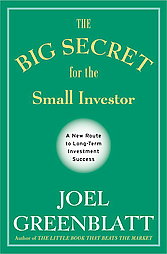

 Joel Greenblatt has a sense of humour—I’ll grant him that. In The Big Secret for the Small Investor (Wiley, 2011), he pokes fun at the crass title of his previous book, You Can Be a Stock Market Genius
Joel Greenblatt has a sense of humour—I’ll grant him that. In The Big Secret for the Small Investor (Wiley, 2011), he pokes fun at the crass title of his previous book, You Can Be a Stock Market Genius , and goes so far as to renounce it: “It was meant to help the individual investor, too. It didn’t.” Now the author has new strategy to share with his readers.
, and goes so far as to renounce it: “It was meant to help the individual investor, too. It didn’t.” Now the author has new strategy to share with his readers.
Greenblatt spends the first few chapters building his case by explaining why identifying undervalued stocks is far more difficult than it sounds. Then he describes the challenges faced by active managers: if they are index huggers they almost never beat their benchmarks, and if they are more adventurous they risk periods of dramatic underperformance, which usually gets them fired. As a result, managers become so obsessed with short-term results that they can’t follow through with legitimate strategies—such as value investing—that might actually do well over the long term.
If you think you’re about to hear an argument for indexing, you’re right—sort of. Greenblatt doesn’t take the position of orthodox passive investors: that you should be content to achieve market returns at the lowest possible cost. Rather, he suggests that individual investors can beat the market—it’s just that they’re going about it the wrong way.
Greenblatt argues that traditional index funds are likely to beat most stock pickers, but you can do a lot better. He reviews the usual criticisms of cap-weighted indexes and touts fundamental weighting and equal weighting as superior alternatives. So far, nothing too surprising.
So what’s the big secret Greenblatt has been waiting to reveal? (Spoiler alert.) The secret is that investors can earn even better results with funds that track value-weighted indexes. Specifically, he recommends weighting stocks according to “cheapness,” as measured by trailing earnings yield, and “quality,” measured by trailing return on capital. He provides a table showing that the S&P 500 has returned 7.6% annually since 1990, while a value-weighted index would have returned 13.9%.
One secret remains
Getting to the end of Greenblatt’s book reminded me of the series finale of The Sopranos: you’re left wondering what just happened. After spending nine chapters making an argument for investing in value-weighted indexes, there’s no mention of how to actually do this. A brief appendix lists some fundamental and equal-weighted ETFs, as well as some value ETFs from Vanguard and iShares, but he’s quick to note these do not track the value-weighted indexes he’s been talking about. In fact, there don’t seem to be any products that follow Greenblatt’s strategy.
Then comes the last paragraph: “We have created a free website, valueweightedindex.com, to keep readers up to date on what I believe will be a growing area in the investment field.” Visit the site and you’ll eventually figure out that Greenblatt has created two mutual funds based on the ideas described in the book. In other words, the big secret for small investors is: “If you want to beat the market, buy my funds.”
I admit I felt duped—as though I had just read a 150-page marketing piece disguised as a book. I get that many financial authors have vested interests, but I have more respect for the ones who aren’t so sneaky about it.
This spud’s for you
I get a lot of email from people who have questions about the Couch Potato strategy, and I do my best to respond to all of them. It recently dawned on me that other readers would be interested in many of the questions and answers. So I’m happy to announce a new Q&A feature on the blog, which I’ll run a few times a month.
If you have a question about index investing—whether theory or practice—drop me a line and I will answer the best ones in future posts.
A few ground rules apply. I can’t dispense investment advice to individuals: since I’m not a licensed advisor, it’s irresponsible and potentially illegal. So please don’t ask me to review your portfolio, draw up a financial plan, or recommend individual securities. I’ll just refer you to a good advisor.
To get things rolling, I invite you to post a question below and I’ll enter you in a draw to win a copy of The Big Secret for the Small Investor. Even though I spoiled the ending, it’s still a worthwhile read for index investors with a value bent. Contest closes Monday, June 6, at midnight EST.












